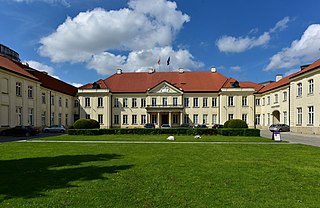
National Democracy was a Polish political movement active from the second half of the 19th century under the foreign partitions of the country until the end of the Second Polish Republic. It ceased to exist after the German–Soviet invasion of Poland of 1939.

Ursula von Rydingsvard is a sculptor who lives and works in Brooklyn, New York. She is best known for creating large-scale works influenced by nature, primarily using cedar and other forms of timber.

The Ministry of Culture and National Heritage is a ministry within Polish government led by the Minister of Culture and National Heritage responsible for national heritage preservation and Polish culture promotion. Ministry oversees state or partially state cultural institutions and implements the law regarding art and cultural property. Ministry headquarters are located at Potocki Palace, 15 Krakowskie Przedmieście Street in Warsaw. Incumbent minister has been Hanna Wróblewska member of the Cabinet) since May 2024

Ewa Maria Wiśniewska is a Polish actress. During her career, she won several awards, include two Polish Film Awards, Polish Film Festival Awards, and Złota Kaczka. She is also recipient of Order of Polonia Restituta and Gloria Artis Medal for Merit to Culture.

The Wawel Royal Castle National Art Collection is the residence museum and collection housed in the historic Wawel Castle of Kraków. The collection was inaugurated officially in 1930, with its current name introduced in 1994.

The Museum of the Second World War is a state cultural institution and museum established in 2008 in Gdańsk, Poland, which is devoted to the Second World War. Its exhibits opened in 2017. The museum is supervised by the Ministry of Culture and National Heritage.

Tygodnik Illustrowany was a Polish language weekly magazine published in Warsaw from 1859 to 1939. The magazine focus was on literary, artistic and social issues.

The Roman Dmowski Monument in Warsaw is a bronze statue, 5 meters tall, of Polish politician Roman Dmowski in Warsaw, on Na Rozdrożu Square at the intersection of Szuch and Ujazdów Avenues. It was unveiled on 10 November 2006. The statue holds a copy of the Treaty of Versailles and carries a quotation from Dmowski's book: "I am a Pole, so I have Polish duties...". The monument has been controversial.

The Małopolska Institute of Culture is a regional cultural institution engaged in promoting and supporting the culture of Małopolska. The institute was founded in 2002 and is located in Kraków. Its main focus is integrating diverse small regional cultural institutions - museums, archives or local cultural centres.
Maciej Szymon Cieśla was a Polish artist, graphics designer and visual communication designer. He was responsible for visual design of World Youth Day 2016.

Gabriela Muskała is a Polish actress, screenwriter and director.

Jan Krzysztof Żaryn is a Polish historian, professor and politician, who was a Senator in the Senate of Poland from 2015 to 2019.

Jakub Radomir Kumoch is a Polish political scientist, journalist and diplomat, since 2023 serving ambassador to China. He previously served as the Head of the International Policy Bureau in the Chancellery of the President of Poland, and as the Polish ambassador to Turkey (2020–2021), as well as to Switzerland (2016–2020).

Joanna Scheuring-Wielgus is a Polish politician. She is a member of the Sejm for The Left political coalition. In December 2023 she was appointed a secretary of state in the Ministry of Culture and National Heritage.

The Virtus et Fraternitas Medal is a Polish state decoration established on 9 November 2017.

Joanna Maria Pilecka is a Polish diplomat, serving as an ambassador to Portugal (2021–2024).
Stanisław Mieczysław Gebhardt is a Polish former Resistance fighter, economist, émigré political activist, international social entrepreneur, and veteran member of the Christian democratic movement. Since his return to Poland after the Fall of the Berlin Wall, he has been associated with centre-right politics and regarded as a political historian.
Jan Maletka (1921-1942) was a Polish railway worker. On 20 August 1942 he was murdered by the Germans for providing water to Jews being transported to the Treblinka concentration camp. On 26 November 2021, as a part of the Called by Name project, a plaque commemorating him has been revealed in the village of Treblinka, which has sparked a controversy.

Called by Name is a project commemorating Poles who were murdered for aiding Jews during World War II established in 2019 and organized by the Pilecki Institute. By the early 2020s, over 50 individuals have been recognized by the project.

















